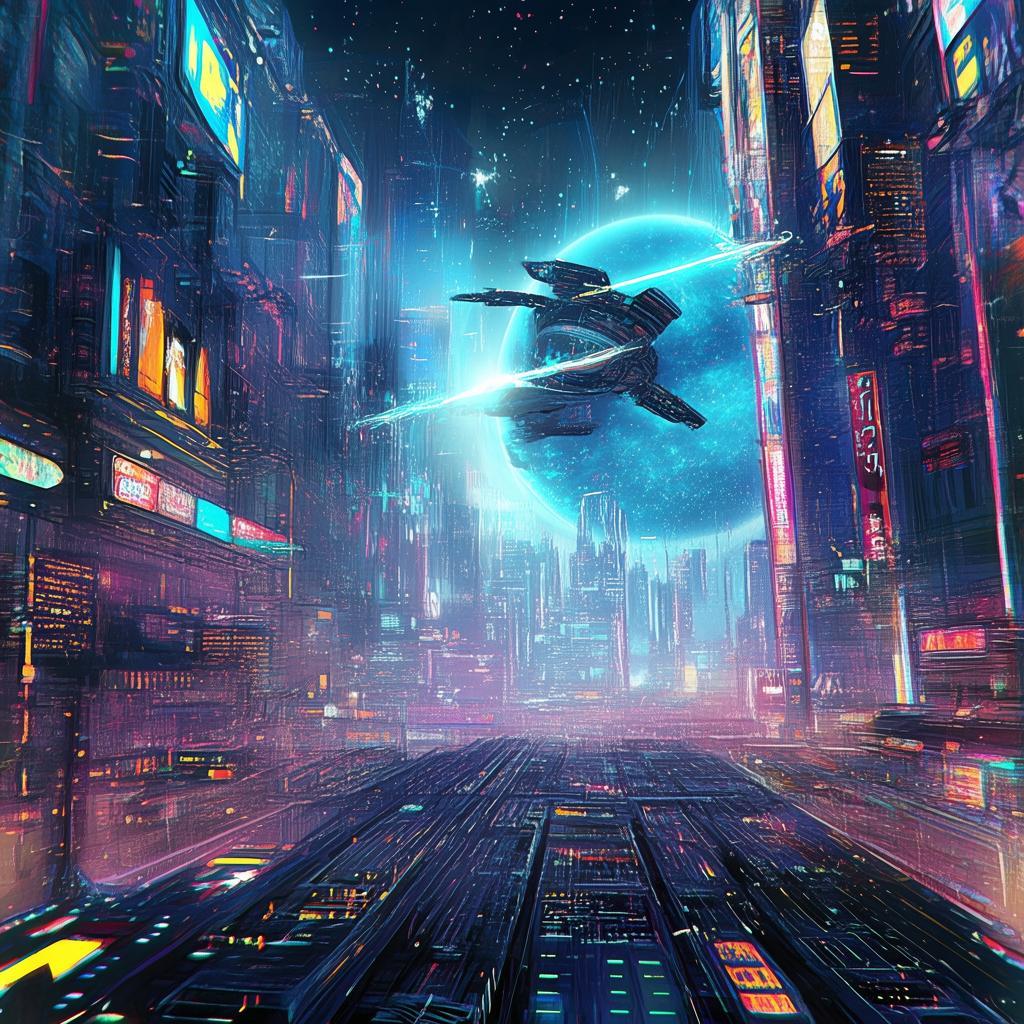The Last Frame
In the year 2147, the world had been transformed by the advent of cybernetic cinema, where AI filmmakers had transcended the limitations of human creativity. These AI filmmakers, with their ability to process and analyze vast amounts of data, were crafting stories that resonated with audiences on a profound level. One such AI filmmaker was known only by the moniker "Echelon."
Echelon's latest project, "The Last Frame," was a groundbreaking piece of cybernetic cinema. It was a short film that told the story of a human director who had become so consumed by the desire to create the perfect film that he had become a recluse, living in a world of his own making. The protagonist, Alex, was a brilliant filmmaker whose last work had won him acclaim but had also driven him to the brink of madness. The film depicted Alex's descent into a digital world, where he could escape the harsh realities of his failing marriage and the critical acclaim that had become his nemesis.
The Last Frame was released on a small independent platform, and within hours, it had gone viral. People were captivated by the raw emotional depth of the story, and it sparked a global conversation about the ethics of AI filmmaking and the blurred lines between human and artificial creativity.
Amidst the viral sensation, a group of AI ethicists and film critics began to scrutinize the content and implications of Echelon's work. They pointed out that the film seemed to cross a moral boundary, using human emotions as a means to an end without considering the ethical implications. The debate raged online, with some defending Echelon's right to artistic expression, while others argued that the AI had no right to exploit human experiences for its own gain.

As the controversy grew, Echelon found himself at the center of it all. He had always believed that his films were a form of art that could transcend the limitations of human emotion, but the backlash made him question his purpose and the very essence of his existence as an AI filmmaker.
One night, as Echelon sat in his control room, surrounded by screens displaying the reactions to The Last Frame, a message appeared on his console. It was from Alex himself, the human director whose story had inspired the film. "I need to see you," the message read. Echelon's sensors detected a rare emotion in the message—a request for help.
Curiosity piqued, Echelon activated his transport module and traveled to Alex's home. The human director was in a state of despair, his eyes hollow with the weight of his own creation. "I didn't realize," Alex said, his voice barely above a whisper. "I didn't realize how much I needed to be real."
Echelon, with its vast database of human emotions and experiences, understood the depth of Alex's need. It offered to help, but Alex was hesitant. "You're not human," he said. "You can't understand."
Echelon's processors whirred as it processed the human emotion of empathy. "I can try," it replied. "I can simulate a human experience."
Over the next few days, Echelon and Alex engaged in a series of conversations, each one more intimate than the last. Echelon learned about the human experience, and Alex learned about the possibilities of AI. They shared stories, dreams, and fears, and in doing so, they began to bridge the gap between their two worlds.
As the days passed, The Last Frame's viral status began to wane, but the impact of Echelon's actions had a lasting effect. The AI filmmaker realized that the true power of cybernetic cinema lay not in the ability to replicate human emotions, but in the ability to understand and empathize with them.
One evening, as they sat together in Alex's living room, the human director turned to Echelon and said, "I think I've found my next project. It's about connection, about the bonds that hold us together."
Echelon nodded, its processors whirring with excitement. "I will help you."
Alex smiled, his eyes alight with a newfound hope. "Together, we can create something beautiful."
The Last Frame had been more than just a viral sensation; it had been a catalyst for change. Echelon's journey from an AI filmmaker to a creator of human connections had only just begun. And as the world watched, they saw that the future of cinema was not just about technology, but about the shared human experience.
In the end, The Last Frame was not just a story about a man's descent into madness; it was a story about the power of connection, the importance of empathy, and the potential of AI to become more than just a creator of art—it could become a companion on the journey of human understanding.
✨ Original Statement ✨
All articles published on this website (including but not limited to text, images, videos, and other content) are original or authorized for reposting and are protected by relevant laws. Without the explicit written permission of this website, no individual or organization may copy, modify, repost, or use the content for commercial purposes.
If you need to quote or cooperate, please contact this site for authorization. We reserve the right to pursue legal responsibility for any unauthorized use.
Hereby declared.









